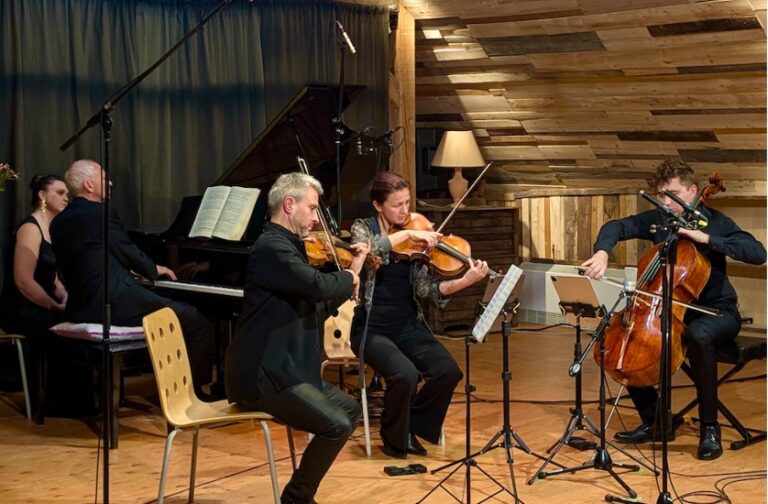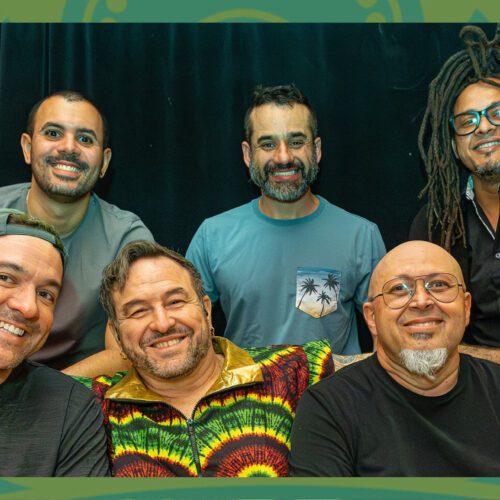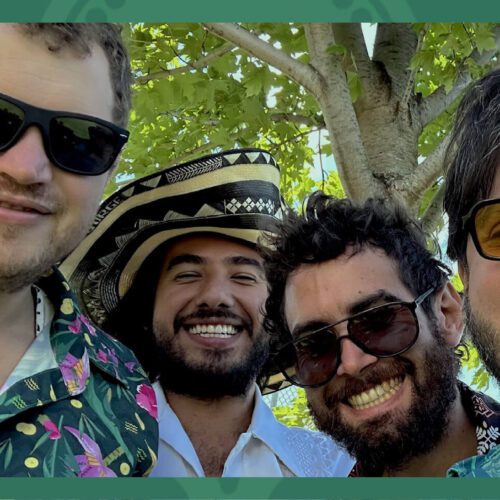Additional Information
There’s a link between agriculture and culture that needs to be re-established in an age when this intrinsic link in traditional societies has long since been severed. On Montreal’s South Shore, artists and farmers have set their sights on restoring this link in a post-modern way, and even turning it into a way of life. Virtuoso violinist Emmanuel Vukovich and his farmer partners from the Cadet Roussel farm are at the helm of the project’s artistic pole, creating a program of concerts presented on the farm, in a hall perfectly equipped to carry out this initiative. In the midst of a socio-financing campaign, the Festival Concerts de Saint-Grégoire unfolds for the first time this summer, following the presentation of numerous “agri-cultural” events. Here, Emmanuel Vukovich explains the program and recounts this holistic adventure.
PAN M 360: Who are the artists involved in this concert series?
Emmanuel Vukovich: The first season of Festival Concerts de Saint-Grégoire brings together a remarkable group of artists from Quebec, Canada and around the world, chosen not only for their artistic excellence, but also for the consistency of their approach with the festival’s fundamental themes of land, community and cultural dialogue.
Tambuco – This world-renowned Mexican percussion ensemble, four-time Grammy Award nominees and featured on the James Bond Spectre soundtrack, will perform as part of our Latin American intercultural exchange festival. Their presence pays tribute to the profound cultural contributions of Latin American farm workers in Quebec, while offering a sonically rich and globally relevant artistic voice.
Gabriela Ortiz – Mexican composer and Grammy Award winner in 2024, Ortiz represents a powerful contemporary voice in Latin American music. Her chamber works bring urgency and depth to the intercultural dialogue at the heart of the festival’s August program.
Chloé Sainte-Marie – Celebrated Quebec singer, actress and activist, Sainte-Marie brings a powerful presence to the festival thanks to her longstanding dedication to aboriginal and rural communities. Her voice embodies the emotional and social dimensions of the festival’s core mission.
Layale Chaker – Lebanese-American violinist and composer, Ms. Chaker’s work blends classical traditions with Middle Eastern improvisation. Her participation testifies to the festival’s openness to transcultural expression and diasporic perspectives.
Kinan Azmeh – A Syrian-American clarinetist known as a soloist, composer and improviser, M Azmeh’s fascinating fusion of multiple musical traditions reflects the spirit of creative dialogue that the festival seeks to nurture.
Aldo Mazza – Montreal-based Cuban-Italian percussionist and founder of KoSA Music, Mr. Mazza brings decades of experience in linking music, education and social justice, and his participation reflects the festival’s commitment to musical excellence rooted in civic engagement.
Dominic Desautels is one of Canada’s most sought-after wind instrumentalists, with a flourishing career as soloist, chamber musician, orchestral clarinetist and teacher.
Jean-Philippe Sylvestre – In 2008, Jean-Philippe Sylvestre received the prestigious Virginia Parker Award, the highest distinction awarded by the Canada Council for the Arts.
Chef John Winter Russell – Founder and owner of Montreal’s renowned Candide restaurant .
Chef Mariana Martin – Founder of Alma Restaurant and Carlotta Bakery, Ms. Martin reinforces the festival’s integration of agriculture, culture and hospitality as interconnected expressions of community care.
Parcival Project Ensemble – This collective (which I direct), forms the artistic heart of the festival. The world premiere of Parzival & Feirefiz – a new Grail tale for diversity, in collaboration with Tambuco, illustrates the festival’s mission to foster renewal and reconciliation through the arts.
Together, these artists embody the values of the Festival Concerts de Saint-Grégoire: artistic excellence, cultural inclusion, environmental awareness and the conviction that music can be a living bridge between people, places and traditions.
PAN M: Where did the inspiration for “Agri-Culture” come from?
Emmanuel Vukovich: The inspiration for this project stems from a lifelong quest to reconcile apparent contrasts, to build bridges between worlds that are often considered disconnected. At the heart of this project lies a personal and artistic quest: to bring together music and agriculture, science and art, humanity and nature. Like Bach, Goethe and Bartók, artists who saw scientific research and artistic creation as equally vital, I believe that the creative act is most powerful when it draws on multiple ways of thinking and being.
Agri-Culture: Concerts de Saint-Grégoire is a response to an age marked by divides – between individuals, between communities, and between humans and the land. It is founded on the conviction that music and agriculture, like body and mind, support different but equally essential parts of our humanity. As Shakespeare wrote, “if music be the food of love, play on”; this hidden link between artistic and agricultural nourishment is at the heart of the festival’s vision.
Located on the Cadet Roussel Farm, a pioneer in organic and biodynamic agriculture, at the foot of Mont-Saint-Grégoire, the festival cultivates deep ties between the artistic and the agricultural, in resonance with the rhythms of the earth. Rooted in traditions of agri-cultural excellence, Agri-Culture is a space of renewal and reconciliation where music, land and people unite to build resilient communities. It is also a catalyst for local economic vitality and global ecological awareness, offering a new way of engaging with the land and with each other through creativity, hospitality and shared presence.
PAN M 360: Where does your commitment to the Cadet-Roussel farm and its “Agri-Culture” approach come from?
Emmanuel Vukovich: My connection with Ferme Cadet Roussel goes back over twenty years. I first came to the farm in 2004, when I was studying music and environmental and agricultural studies at McGill University. What began as a formative summer working on the farm quickly turned into a long-standing friendship and collaboration with Anne Roussel and Arnaud Mayet, the farm’s co-founders. Over the years, we’ve adopted a common vision: the artistic and agricultural spheres – often considered unrelated – can in fact complement and reinforce each other.
The idea of integrating concerts into farm activities matured over time and crystallized during the pandemic. When all cultural gatherings were halted and musical spaces closed, farms like Cadet Roussel continued to function as essential services.It was then that the idea of a festival – a living dialogue between art and the land – really took root.
Drawing on my experiences at New York’s Churchtown Dairy Farm (a Rockefeller family project) and my involvement in co-directing Symphony in the Barn in Ontario, I was inspired to imagine a festival where world-class music could take place not in an isolated setting, but to the rhythm of the earth’s cycles. Located at the foot of Mont-Saint-Grégoire, Ferme Cadet Roussel – with its pioneering biodynamic practices – offered the ideal setting.
Les Concerts de Saint-Grégoire is not just about giving concerts in a rural setting, it’s about cultivating the deep, often hidden interconnection between cultural and ecological life. The project invites audiences toengage simultaneously with music and the land, and aims to foster an international artistic community that is both rooted in this place and aware of its ecological and social responsibility on a global scale.
In an age of increasing polarization, where social media filters have fractured our sense of shared space and purpose, this festival aspires to be a bridge. Through music, agriculture and hospitality, we hope to create an inclusive and socially engaged space for dialogue – a space that reconnects people not only to each other, but also to the earth that nourishes us all.
PAN M 360: What is your business model in line with your community’s values?
Emmanuel Vukovich: The Concerts de Saint-Grégoire business model is rooted in the same principles that guide the ecological and community-based approach of Ferme Cadet Russel, the farm that hosts the festival. This pioneering biodynamic farm operates on the Community Supported Agriculture (CSA) model: members commit to supporting the farm throughout the production season, and in return receive a weekly share of fresh organic produce as needed.
Rather than functioning as a classic commercial transaction between producer and consumer, this model creates a relationship of shared responsibility: the community helps support the farm, and the farm, in turn, nourishes the community, not only with food, but also with a sense of belonging, continuity and care for the land.
Les Concerts de Saint-Grégoire applies this same philosophy to the arts. Rather than offering isolated, one-off cultural events, the festival is conceived as a seasonal experience that develops in harmony with the farm’s agricultural rhythms. It integrates music and public gatherings throughout the year, creating opportunities for the community to come together, just as it does to celebrate spring planting or the great autumn vegetable harvest.
In this sense, the festival is not an external addition to the farm, but a natural extension of its mission, transforming the cultural experience into something participatory and locally rooted. By offering concerts, culinary evenings and cross-cultural events that reflect the values of cooperation, sustainability and mutual aid, the festival becomes another way for people to connect, not only to the land, but also to each other.
Ultimately, the model reflects a broader vision of cultural sustainability, where artistic life is nurtured and supported in the same way as ecological agriculture: through long-term relationships, shared purpose and a deep respect for the living systems – human and natural – that sustain us.
PAN M 360: What is your concert production history?
Emmanuel Vukovich: Between 2001 and 2003, I was co-artistic director of Symphony in the Barn, an international summer music festival held at Glencolton Farms, a biodynamic dairy farm in Ontario , where I also had the privilege of conducting the festival orchestra as concertmaster, under the artistic direction ofErnst Dunshirn, director of theVienna Philharmonic Orchestra and the Vienna Opera Choir.
Between 2007 and 2009, while living and working at the Cadet Roussel farm, I produced a series of solo violin recitals at several community farms in Quebec, Ontario and New York State. In collaboration with a Radio Canada producer, I recorded and produced a documentary video of these concerts entitled Bach à la ferme, which was revived during the pandemic for the Canada Council’s CBC Digital Originals series. In 2019, the Grande Salle Agri-Culturelle de la Ferme Cadet Roussel was officially inaugurated with a concert performed by beneficiaries of the Canada Council Instrument Bank.
Between 2017-21, I was invited to perform and provide artistic direction for a Bach Odyssey at Montreal’s Chapelle Historique du Bon Pasteur, and I rehearsed Bach ‘s complete cycle of Sonatas and Partitas for solo violin at St Andrew & St Paul Church during the pandemic (2020-21 season).
The Parcival Project gave its first concerts in 2011 and was registered as a non-profit organization in 2012, receiving charitable status in 2017 after an international concert tour of Chile, Argentina and Brazil in 2014.
PAN M 360: You’ve built a hall. What are the characteristics of this hall? Capacity, etc.?
Emmanuel Vukovich: The Grande Salle Agri-Culturelle de la Ferme Cadet Roussel is the former barn loft where hay was traditionally stored for the cows during the winter, and was officially inaugurated as a concert hall in August 2019 and renovated during the pandemic with wood from trees grown and cut on the farm.This is a locally crafted concert hall, and the acoustics of the space are testament to this unique quality, seating around 80-100 spectators. Insulated, heated and air-conditioned, the space houses a permanent Boston-Steinway grand piano .
PAN M 360: What prompted you to present a full season of Concerts de Saint-Grégoire?
Emmanuel Vukovich: The decision to present a full season of Concerts de Saint-Grégoire grew out of a desire to align music with the natural rhythms of the land. Rather than concentrating activity around a single weekend or concert date, we wanted to create a living cultural calendar that followed the seasonal flow of an agrarian year – reflecting the cycles of planting, growing and harvesting at the heart of farm life.
This vision is deeply inspired by the traditional agricultural festivals that have marked rural communities for centuries: the celebration of sowing in spring, haymaking in early summer and bountiful harvests in autumn. In today’s fast-paced and often fragmented world, I believe that revisiting and honoring these timeless patterns through music can offer a meaningful way to reconnect with the seasons, the land and each other.
By presenting concerts throughout the year, each resonating with a particular period of the agricultural cycle, we invite the public to enjoy a more rooted, place-based cultural experience. It’s an opportunity to gather not only around artistic creation, but also around the rhythms that sustain life: growth, change, renewal.
In so doing, the Concerts de Saint-Grégoire become more than a series of performances; they become a seasonal dialogue between music, land and community, a way of bringing people together in celebration, reflection and shared presence throughout the year. This continuous rhythm also allows for greater integration into the daily life of the farm and more inclusive programming, in collaboration with local and international artists.
Ultimately, presenting a full season is a way of grounding the festival in continuity and living connection – qualities we believe are essential not only for cultural vitality, but also for building more resilient and caring communities.
PAN M 360: What is your artistic direction?
Emmanuel Vukovich: Artistic excellence, intercultural exchange and the promotion of the ecology of the art form. I’ve been very interested in the legacy of researchintooral traditions left by Béla Bartók, which links ethnomusicology, ecology and the exploration of musical timbre in the practice of performing and composing new music.
The artistic direction of Les Concerts de Saint-Grégoire is guided by three fundamental principles: artistic excellence, intercultural exchange and collaboration, and a deep commitment to advancing the ecology of the art form itself. For me, artistic excellence is not simply a matter of virtuosity or reputation, but of depth of expression, sonic honesty and the music’s ability to resonate authentically with a specific time, place and community. I seek to select artists and programs that carry this sense of integrity – performers whose work derives from both mastery and meaning.
A commitment to intercultural collaboration is also at the heart of my vision: I believe that music, in all its power, exists in dialogue and innovation – between traditions and other cultures.That’s why the festival invites artists from all disciplines and cultural backgrounds to come together and co-create something new, often through collaboration and exchange. These encounters not only enrich the artistic offering, but also reflect a broader social commitment: to model the kind of respectful, dynamic engagement we hope to see in the world.
The third axis of my artistic direction is a growing interest in musical ecology – both literal and metaphorical – and in the advancement of the art form of classical music. Inspired by Béla Bartók ‘s research into oral traditions and ethnomusicology, I am fascinated by the way in which music can reflect and interact with its environment.Bartók’s research into the folk and peasant melodies of Eastern Europe, Turkey and North Africa provides us today with a model of how music can be both rooted in tradition and offer new possibilities for the future.
In the same way that ecological agriculture works in relation to the living system of life, I see musical and artistic collaboration and leadership as a living system – one that thrives on diversity, care and regeneration.
Through Les Concerts de Saint-Grégoire, I hope to cultivate an international artistic community and culture where these values converge: where world-class performances develop in harmony with the local context; where intercultural exchange is not just a gesture, but a process; and where the ecology of music – as a cultural, emotional and communal force – is nurtured over time.
PAN M 360: What are your plans for the future?
Emmanuel Vukovich: My plans for the future are rooted in a long-term commitment to making a significant contribution to the continuation and evolution of classical music, not only as a performer or curator, but also as someone deeply involved in shaping the cultural ecosystems that support it.
I believe that classical music has enduring relevance, but its survival and vitality depend on our ability to honor its traditions while continually expanding and defining its relevance. My goal is to create artistic experiences that are both rooted in the legacies of the past and open to the realities and urgencies of the present. This includes rethinking how and where classical music is shared, to whom it is addressed, and how it might evolve in dialogue with other musical and artistic traditions, other cultures, other disciplines and other ways of life.
For the future, I intend to make Les Concerts de Saint-Grégoire a living laboratory for artistic innovation – a place where performers, composers and audiences engage with classical music by being immersed in nature, shaped by community and attuned to the rhythms of the earth.This vision goes beyond the concert hall; I’m particularly inspired by the idea that music is a form of ecological listening, a way of deepening our awareness not only of sound, but also of our place in the world.
In this sense, my future work will continue to explore how music can reflect the links between human life, the natural world and the cosmos. I’m interested in projects that integrate environmental awareness, scientific intuition and spiritual inquiry – each informing the way we compose, perform and experience music. Whether it’s interdisciplinary collaborations, new commissions or site-specific performances, I see it as a path to an art form that is not only preserved, but continually renewed.
Ultimately, my aim is to participate in a future where classical music remains a vital force – alive, evolving and in deep resonance with the beauty and wisdom of the human imagination and the natural world that sustains it.
PAN M 360: Who is the team working with you on this project?
Ferme Cadet Roussel
Le Projet Parcival
Latitude 45 Arts
Ensembl’Arts
La Ruche
Donna Williams
Noémie Raymond
Boulangerie Carlota
Restaurant Candide
Montreal Museum of Fine Art
Consulate du Mexique à Montréal
PAN M 360: How do you manage to finance a concert season?
Emmanuel Vukovich: While our long-term goal is to build a funding model inspired by the cooperative approach to ecological farming practiced at Ferme Cadet Roussel, our first season is currently funded by a more traditional structure. This includes a mix of public arts funding, private donations and targeted project grants that support artists’ fees, production costs and essential infrastructure.
The cornerstone of this year’s financing is our participatory fundraising campaign on La Ruche, supported by a matching grant from the Quebec Ministry of Tourism’s Horizons d’ici program. Every dollar contributed by the public is matched, but only if we reach our goal of $61,876 by June 15, 2025. This campaign is not just a financial tool; it reflects the spirit of shared responsibility and grassroots participation that we hope will define the future of the festival.
Ultimately, we envision a model that mirrors the Community Supported Agriculture (CSA) system used by Ferme Cadet Roussel, where members commit to supporting the entire growing season and, in return, are fed throughout the year.
Similarly, we aim to develop a sustainable cultural ecosystem supported by a community of listeners, partners and creators. But to achieve this, we must first lay the foundations.
Right now, reaching our crowdfunding goal is essential to making this inaugural season possible. It’s an invitation to become co-creators of the project right from the start, helping us sow the seeds of a festival rooted in the rhythms of the earth, the power of music and the strength of collective commitment.
PAN M 360: What is your socio-financing goal with La Ruche?
Emmanuel Vukovich: The crowdfunding campaign between May 15 and June 15, 2025, organized by the Quebec crowdfunding platform La Ruche with a matching grant from the Quebec Ministry of Tourism – Fonds Horizons d’ici. A minimum of $61,876 must be raised before June 15 for the matching funds to be awarded.We invite all those wishing to support the project to make a donation and purchase tickets for our festival before June 15!
























